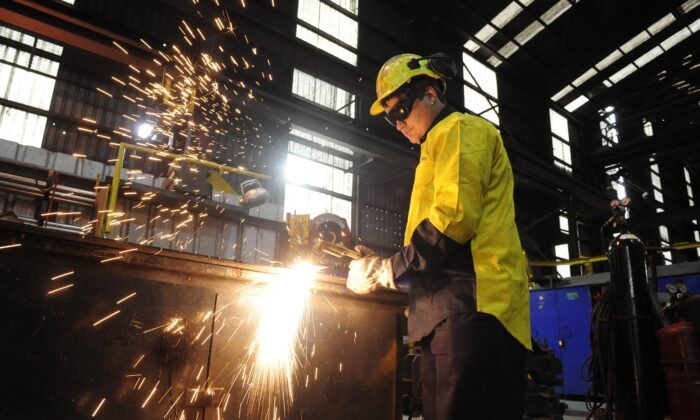Australian Manufacturers Struggle to Survive as Hard Work Fails to Yield Adequate Returns
Australian manufacturers are facing challenges due to high inflation and government policies, making it tough for them to survive.
Testifying before an Australian parliamentary committee, manufacturers shared their struggles amidst high inflation and government policies.
Matthew Fogarty, director of Celsius Manufacturing Pty Ltd, a Victorian-based company specializing in ductwork with 20 employees, revealed the difficulties his company has faced over the last couple of years.
“I see every cost gone up. We buy a lot of steel, we buy a lot of insulation … all those things have really jacked up our import input costs, which made it really hard,” he said during a recent parliamentary inquiry hearing on the cost of living.
“The costs that we have every day, our utilities, our technology rental, has gone through the roof.”
Fogarty mentioned having to sell and mortgage everything he owned to run the business, with minimal returns.
“[The company] employs a lot of people, makes a contribution to our country, but I don’t feel that reciprocated,” he said.
“We work pretty hard to get not very much return. And probably the question I’m left with is, why take those risks?”
Simon Whiteley, the managing director and CEO of Corex Plastics Australia, also shared the challenges his company is facing.
“We have a lot of state taxes that are affecting us,” he said.
“In Victoria, my land tax bill, for example, has gone up 200 percent over four years, along with payroll tax and WorkCover [insurance] in particular, … it went up 78 percent last year.”
Impacts of State Energy Policies
Whiteley also highlighted the significant impact of state governments’ energy policies on his company and other manufacturers.
He pointed out the obstacles created by the Victorian government, making it challenging for companies to invest in energy technologies other than solar.
However, Whiteley explained the impracticality of investing in solar due to negative energy prices during the day, which do not yield returns for renewable energy operators.
Negative energy prices occur when energy generators pay consumers to generate electricity instead of the other way around, indicating a surplus of supply over demand.
Jon Seeley, group managing director of Seeley International, an air conditioner manufacturer, echoed similar frustrations, citing the Victorian government’s energy policy as a hindrance.
Changes in Industrial Relation Laws Add Burden for Businesses
In addition, Seeley discussed how recent changes in industrial relation laws would lead to job losses at his firm.
He explained the necessity of hiring additional casual staff during peak seasons at their two factories, but due to new laws on casual employment, the decision was made to amalgamate operations into one factory, resulting in job losses for permanent employees.
Another member of the South East Melbourne Manufacturers Alliance highlighted the increased overhead costs due to labor expenses related to the changes in industrial relation laws.



